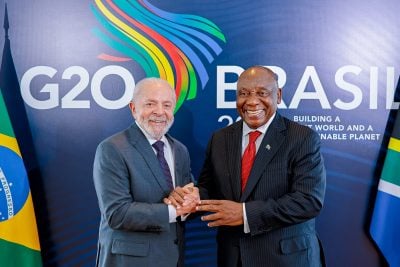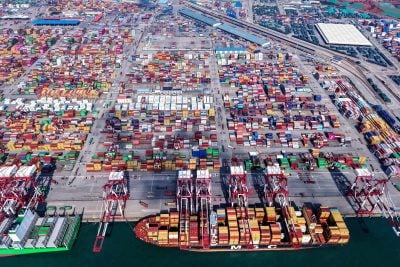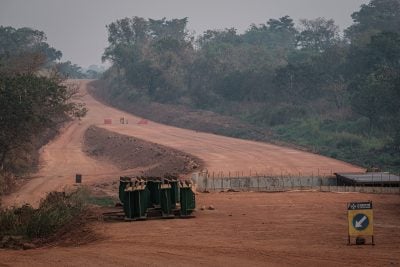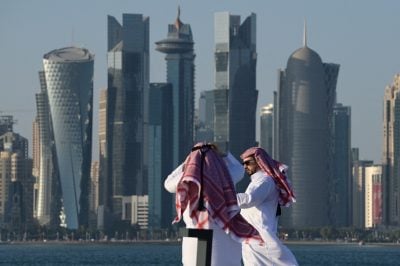In the wake of Covid-19, the global supply chain ecosystem is still undergoing a stress test of macro-megashocks: pandemic followed by war.
It will be some time before it will be clear how this will all play out. But it’s extremely important to take some time to reflect on this against historical patterns or many nations will be navigating blindly and sleepwalk through what’s coming. There may yet be more socio-political foment and geopolitical upheaval.
The shock of the Russia-Ukraine war is of course globally significant, not least because of the attention the “global” media puts on what is happening on its doorstep in Europe, but there are many other conflicts also taking place globally at the moment.
Ethiopia, Yemen, Sudan and the Horn of Africa could soon be completely destabilised, and this will, in turn, affect migration patterns and stability in Europe and the Middle East.
I fear that global shocks are going to escalate and that they could do so quite quickly unless some dramatic and pragmatic diplomatic intervention happens that is focused on peace in the international system.
If the conflict in Ukraine becomes intractable with no clear endgame, the pressure on supply chains, and therefore on food prices and energy prices, would be catastrophic.
When the war in Ukraine started over 400 days ago, what was immediately apparent was that African countries and Middle Eastern countries did not want to take sides in the Russia conflict.
Africa’s voting record at the UN General Assembly has been mixed, and no African country has implemented sanctions against Russia.
Similarly, not a single country in the Middle East has imposed sanctions. But where are these sanctions meant to end? Do countries who are more sympathetic to Russia get isolated and sanctioned? What’s the play?
South Africa could take sides with Russia and China in the event of World War III. Following accusations from the US that South Africa has been supplying arms to Russia, what could happen next?
Certainly sanctions are a transatlantic and European issue. But continue to look out in the next two to three months for the extent to which China gets openly involved, and whether it will be emboldened by South Africa’s position.
Would China provide live munitions to Russia and fight alongside it? Who else could join sides in the event of such a terrifying escalation? North Korea, Iran and Syria certainly, and perhaps some other Middle East countries.
Those are a lot of petrodollars that could swing Russia’s way. Many leaders I think in the Middle East and Global South will wait and see which way the wind blows.
It’s a free for all now – the old allegiances have atomised.
We should not underestimate the loyalties formed between Africa, Russia and China during the decolonisation of Africa, and that is a de facto decolonisation of international relations.
The geopolitics of energy and climate change
Russia extended considerable help to some African countries such as Angola and South Africa during decolonisation. It was particularly supportive of South African freedom fighters in exile during the struggle against apartheid.
It would be interesting to see what happens if Putin asks for help from South Africa or the continent at large. I think given recent accusations from the US that South Africa has supplied arms to Russia, this is not so far-fetched.
There has been a lot of brouhaha recently about whether South Africa should arrest Putin at the upcoming BRICS summit, but I would be genuinely surprised if Putin leaves the Kremlin to attend in person and risks coming back to a coup or an assassination attempt.
Will the BRICS eventually rival the G7 on the global stage?
The weight of the five BRICS countries – Brazil, Russia, India, China and South Africa – is increasing in the world economy.
“Last year’s GDP data shows that collectively they are now, in PPP terms, already bigger than the G7. By the end of this decade, China is going to be pretty close to the size of the US while India is going to be close to overtaking Germany. So two of the biggest four economies in the world are two of the BRICS,” says Lord Jim O’Neill.
Read more in our exclusive interview with the economist who coined the name “BRICS”.
In May, President Cyril Ramaphosa of South Africa announced the launch of an African mediating mission in Ukraine. Alec Russell in the FT does not think it will be historically significant. I beg to differ. From the African experience you take help where it is given and this is why Russia has been accepting support from nations on the fringes of the international system, such as Iran, Syria and North Korea.
This war is yet to play out and I am afraid it will only escalate because of grandstanding by the likes of Sunak, Macron and Biden, and the seeming reluctance of Zelensky to explore negotiating or diplomatic strategies.
But can one negotiate with Putin? And, if he is weakened, is it worth Zelensky taking a gamble on a coup within the Kremlin? Many analysts say Russia will still be vengeful should Putin fall on his sword.
The impact on climate change
All of this is a major distraction from the planet’s climate change goals. Covid and Ukraine have spurred a lot of backtracking on some of the commitments that were made for climate action at Cop 26 and Cop 27. This will only continue into Cop28 as the oil sector hijacks the discourse of the “just transition” from activists.
But the climate crisis is escalating apace. The year 2022 broke records for high temperatures, and it looks like we are on course for another record year for temperatures as well as extreme events like wildfires and flooding in places as far apart as South Africa, the US, UK, Italy and Australia.
Renewables may seem expensive in the short term, particularly in the context of the war in Ukraine. But in the medium-term we will see energy prices decelerate at speed.
The question has been raised of where the demand is for green energy. It is everywhere where people need energy, and the planet simply cannot, from an environmental perspective, afford not to put it towards renewables. There is much talk about getting African countries to capitalise on the recent hydrocarbon finds, but dig deeper and these are being talked up by European oil companies.
This may not be the best route for these countries to take, as much as they need to industrialise and be paid reparations. We may yet see African countries sitting with stranded assets on the balance sheet. There are so many perennially sunny countries on the continent. Why not invest in solar?
When thinking of renewables vs hydrocarbons, we don’t even need to take a long-term view. We will see rapid escalation of the climate situation that will make the planet so uninhabitable that World War III over some megalomaniac quest to revive the Russian Empire will be the least of our concerns in less than three years. This is not the first time I have written: net zero, now.
Frans Timmermans, executive vice-president of the European Commission, and Josep Borrell, high representative of the European Union for foreign affairs and security policy, wrote a striking piece on the geopolitics of climate change in April 2021 for Project Syndicate.
They explain that the European Green Deal aims to substantially recalibrate these pressure points. It will not only address carbon emissions and climate change with an ambitious plan to reduce EU emissions by 55% by 2030 and total neutrality by 2050 but also, in so doing, help to becalm the geopolitical flash points discussed above (for further details see box).
The analysis was prescient, and the war in Ukraine shouldn’t distract Africans from energy and climate change, the contested site of the new geopolitics in the age of the BRICS+.
The geopolitics of climate change
There is no time to lose in tackling the climate change and biodiversity crises, and by tackling them everybody will be better off, but “as with any broad transition, the coming changes will upset some and benefit others, creating tensions within and between countries”, warn Frans Timmermans and Josep Borrell in their April 2021 Project Syndicate article “The geopolitics of climate change”.
The transition from a hydrocarbon-based economy to a sustainable one based on renewable energy will shift power away from those controlling and exporting fossil fuels, and toward those mastering green technologies. Old strategic choke points such as the Straits of Hormuz will become less important, but the phasing out of oil exports will reduce the geopolitical power of countries such as Russia and make them more prone to adventurism.
At the same time, the green transition will increase reliance on certain minerals, some of which are concentrated in countries that the authors say are willing to use natural resources as foreign policy tools.
“Though the green transition will bring about more sustainable and resilient economies, it will not automatically usher in a world with less conflict or geopolitical competition,” write Timmermans and Borrell.
“To Europe’s south,” they add, “there is enormous potential to generate energy from solar and green hydrogen, and to establish new sustainable growth models based on renewable energy. Europe will need to cooperate closely with the countries of Sub-Saharan Africa and elsewhere to seize these opportunities.”
This article is based on a speech given at an event organised by Addeshaw Goddard and Invest Africa on 1 March 2023 and adapted from a version that originally appeared in IC Intelligence Insight 09 –The New Geopolitics. Read the full insight via bit.ly/3Jmaq9V
Want to continue reading? Subscribe today.
You've read all your free articles for this month! Subscribe now to enjoy full access to our content.
Digital Monthly
£8.00 / month
Receive full unlimited access to our articles, opinions, podcasts and more.
Digital Yearly
£70.00 / year
Our best value offer - save £26 and gain access to all of our digital content for an entire year!
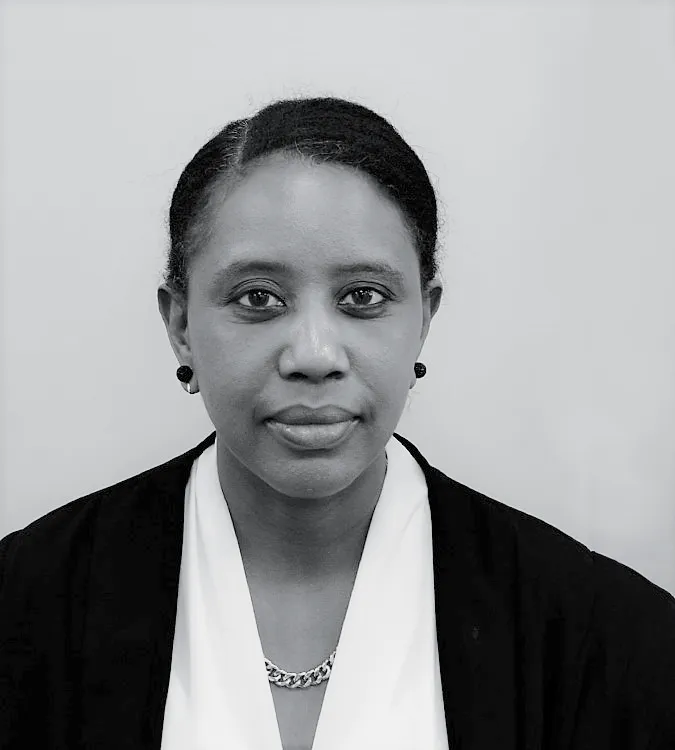
 Sign in with Google
Sign in with Google 
